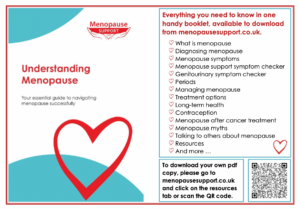NEWS
April 2024 The joint BMS, BSGE, BGCS, FRSH, GIRFT and RCOG guideline on the management of unscheduled bleeding on HRT has been published and can be accessed via the British Menopause Society website.https://thebms.org.uk/2024/04/joint-bms-bsge-bgcs-fsrh-girft-and-rcog-guideline-on-management-of-unscheduled-bleeding-on-hrt/
The document includes new advice on the doses of progestogen needed depending on the dose of estrogen prescribed. Those on the 100mcg estrogen patch or equivalent and micronised progesterone will need to discuss their HRT prescription at their next review as they will need to increase the dose of micronised progesterone, change to another progestogen or reduce their estrogen dose as symptoms allow – see tables below:

THE ‘UNDERSTANDING MENOPAUSE’ BOOKLET AND PDF IS AVAILABLE. See the Resources section of menopausesupport.co.uk to download the pdf and poster (shown below). GPs can order the paper booklets too.
‘Understanding Menopause’ booklet

April 2024 Waiting times as below:
Advice and Guidance – there is currently a 4 week wait for a response to Advice and Guidance requests. Many requests for an appointment can also be managed via Advice and Guidance. Please do continue to write to the service for advice but let your patients know about the waiting times.
Face to face new patient appointments if indicated after triage – currently booking for July/August 2024.
Please note that the service does not have the capacity to fit or remove the Mirena or other 52mg levonorgestrel IUD (LNG-IUD).
We are very pleased to announce that NHS Somerset has given the service funding to continue running until the end of March 2026. The clinic will have some increased capacity from April 2024.

GP and British Menopause Society recognised menopause specialist
Member of the British Menopause Society Medical Advisory Council

Dr Sophie Aldridge
GP and is training to become a menopause specialist
ABOUT THE SERVICE
This service is run by Dr Juliet Balfour, who has been a GP at Glastonbury Surgery for many years and is a British Menopause Society recognised menopause specialist with the Advanced Certificate in Menopause Care. She is also a member of the BMS Medical Advisory Council. She is a BMS menopause trainer but already has a long waiting list of those seeking a trainer so is not adding any more clinicians to this list.
Dr Sophie Aldridge is working alongside Dr Balfour at the clinic and is training to become a menopause specialist.
The clinic is usually held on a Wednesday but will be also be running on another week day from April 2024.
The information on this webpage is for both patients and health care professionals (HCPs).
The service is only available for patients who are registered with Somerset GP surgeries that are part of the Somerset ICB (previously CCG). For a list of the practices that can refer, please click on this link: SOMERSET PRACTICES THAT CAN REFER IN TO THE SOMERSET NHS MENOPAUSE SERVICE
REFERRAL INFORMATION FOR PATIENTS
Most women with menopausal symptoms can be managed by their GP with lifestyle advice and HRT if indicated. If you are having difficulty accessing HRT or you think you may be unable to take HRT, please check the referral criteria listed below. If you meet these criteria you can ask your GP to write to Dr Balfour. She can give advice or, if clinically needed, a face to face appointment at the clinic. This is a limited resource so each referral will be triaged and hopefully lots of issues can be resolved via written advice to your GP. If you do not meet the referral criteria, please check whether your own GP surgery has someone with extra training in women’s health and the menopause who can help you.
The clinic is held at Glastonbury Surgery. If patients need to be seen in the clinic, the first appointment will usually be face to face but patients can request a telephone consultation instead if preferred. You may be seen by Dr Juliet Balfour or Dr Sophie Aldridge.
Follow-up appointments, if needed, will usually be via telephone.
All appointments will be sent out by text with an opportunity for you to indicate whether you can attend or not, and a telephone number to ring if you can’t make that date or if you would rather convert it to a telephone consultation. If you are seen in the clinic, your GP will be sent a letter with the suggested treatment plan and you will be sent a copy of this. Please be aware that these letters may take up to 2 weeks to get to both you and your GP.
Please note that this service cannot provide urgent clinic appointments and does not have the capacity to give medical advice directly to patients apart from during a consultation.
The referral email address below is for health care professionals to use. THIS IS NOT FOR PATIENT USE, ANY PATIENT EMAILS WILL NOT BE ACTIONED.
There is a symptom checker in the symptoms box below. You can download this and fill it in before an appointment with your GP. If you are not on HRT and coming to the clinic, it would be helpful if you could bring a completed symptom checker with you.
IF BEING REFERRED TO CONSIDER TESTOSTERONE, YOU WILL NEED TO ASK YOUR GP FOR BLOOD TESTS FOR TESTOSTERONE AND SEX HORMONE BINDING GLOBULIN LEVELS TO BE DONE BEFORE YOUR APPOINTMENT. IF THE TESTOSTERONE LEVEL IS VERY LOW, THE SHBG REQUEST MAY NOT NEED TO BE PROCESSED.
Please see the boxes below for lots more information about the menopause and HRT.
REFERRAL INFORMATION FOR HEALTH CARE PROFESSIONALS
The email address for referrals is [email protected]
This clinic aims to give clear advice to HCPs on prescribing HRT and non-hormonal alternatives but is unable to issue prescriptions. If blood tests are needed eg for testosterone monitoring (essential if prescribing testosterone) the clinic will ask the patient to arrange these with their own GP. Please note that Dr Balfour is a menopause specialist but not a gynaecologist so any gynaecological investigations will need to be arranged via the GP.
All letters will be triaged by Dr Balfour or Dr Aldridge to decide if the patient can be managed with advice and guidance or if they need to be seen face to face. Due to the large number of women needing this service, the aim will be to provide a detailed management plan to the GP via letter when suitable and if there is enough information in the letter. If complicated or needing detailed counselling about options, benefits and risks, then the patient will be sent an appointment via AccuRx text to be seen in the clinic.
Information needed for the referral:
- why specialist advice is needed
- what the patient is hoping for
- if there is a particular reason why the patient may need a face to face appointment rather than advice and guidance (but a face to face appointment cannot guaranteed)
- what HRT has been tried before and at what dose (brand names needed)
- a summary printout of past medical history and operations, medication, allergies and any blood results from the last 2 years
- if the patient is under 45, please check FSH levels twice, 6 weeks apart if possible. If still having fairly regular periods, the first blood test should be day 1 to 3 of the cycle. You can still refer your patient even if the levels are normal. The progestogen-only pill and Mirena coil do not affect FSH levels but there is no point checking FSH if the patient is on the combined pill or HRT. If on Depo-provera, please do the blood test just before giving the next dose.
- oncology letters if a history of breast cancer or any hormone sensitive cancer
- any letters from the Family History breast clinic or genetics
- if referring a patient to consider adding in testosterone, please make sure they are already on transdermal oestrogen and have had blood tests as detailed below. You can send the results with the referral letter or email them afterwards if done later. Please see the testosterone prescribing guidelines in the box below for further information
Please inform the patient that:
- they may not be seen in the clinic if appropriate advice can be given via advice and guidance
- the initial offer of an appointment will be sent by text
- they can ask to change to a telephone appointment if travelling to Glastonbury would be difficult for them
- due to high demand, A&G responses and waiting times to be seen are increasing
- patients with a history of breast cancer or another hormone sensitive cancer will not be prescribed HRT at the first appointment (more information below)
Patients suitable for referral for advice or an appointment as appropriate:
- patients with complex medical histories when the HCP is not sure if HRT is a safe option e.g. significant active liver disease, a history of heart disease, VTE or stroke
- patients with complex gynaecological history eg endometriosis
- patients who have tried numerous HRT options but have not yet found something that works for them
- patients needing specialist advice on local estogen options for genitourinary syndrome of the menopause (once other causes have been diagnosed or excluded e.g. lichen sclerosus)
- patients who would like to try adding in testosterone, if there is no HCP at the practice who has done training on how to do this yet. Testosterone for women is now green on Somerset ICB prescribing formulary if the HCP is competent to prescribe it. See the information below about the blood tests needed before the appointment
- older women (over 60 or over 10 years since their last period) keen to start or restart HRT if the HCP is not confident about current guidelines
- patients with premature ovarian insufficiency (POI) or an early menopause (see definitions below)
- patients at high risk of osteoporosis or who already have osteopenia or osteoporosis
- younger patients with possible perimenopausal symptoms but fairly regular periods and the HCP is not sure about the diagnosis
- patients on HRT with unscheduled bleeding but only after the current guidelines from the SFT gynaecology team have been followed
- patients with a strong family history of breast cancer – please first check NICE guidelines in case they need to be referred to the Family History breast clinic in Taunton for assessment of their degree of risk and to consider more regular screening and/or genetic testing first. These can be found via the cks.nice.org.uk guidelines:Family history guidelines
- patients with a history of any type of breast cancer or another hormone sensitive cancer but only if not under the Bristol or Bath oncology teams (see below). Hormone sensitive cancers include the majority of breast cancers, endometrial cancer and some types of ovarian cancer. Some meningiomas, prolactinomas, gastric, liver, bladder and lung cancers may also be hormone sensitive. You can write to their oncologist for advice if they have one of these cancers.
- N.B. Non-hormonal medication, CBT and lifestyle changes are first line for patients with a history of a hormone- sensitive cancer and these will be discussed at the first clinic appointment. Local (vaginal) estrogen is usually a safe option, unless on an aromatase-inhibitor. HRT will NOT be prescribed at an initial appointment as these other, safer options need to be tried first. If a patient’s quality of life is severely affected, the other options are not helping and the patient is keen to try systemic HRT despite the possible risks, Dr Balfour will need to liaise with the oncology team and then discuss further with the patient. Please make sure your patients are aware of this before the referral to manage their expectations.
Patients not suitable for referral to this service:
- patients with premature ovarian insufficiency or early menopause if they mainly want to discuss fertility issues
- patients with unscheduled bleeding on HRT – these patients can be referred to the menopause service for advice on adjusting their HRT but only after the latest guidelines from the gynaecology team have been followed. Please note it is common to have some unscheduled bleeding in the first 3 to 6 months after starting or changing HRT. More information in box below
- patients with breast or gynaecological cancers who are already under the Bristol or Bath breast or gynaecological oncology services. These patients should be referred to the combined oncology and menopause clinic at the relevant hospital:
University Hospitals Bristol – Above and Beyond Combined Menopause and Oncology Clinic
Royal United Hospitals Bath – Macmillan Combined Specialist Menopause and Oncology Clinic
More general information for both patients and health care professionals
